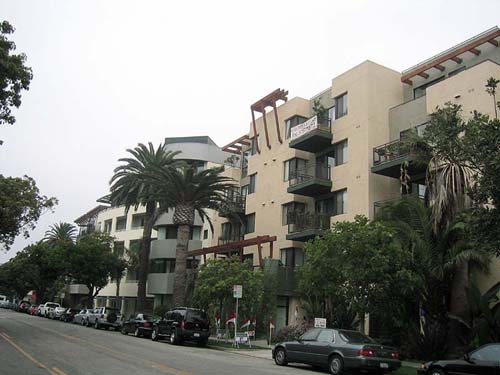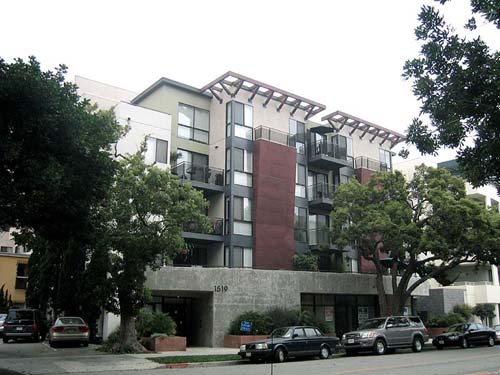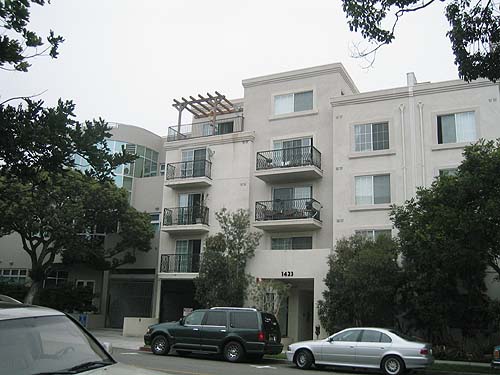| |
|
The Downtown Building Boom: Cracks in the Facade
By Oliver Lukacs
Staff Writer
April 12 -- Six years ago, the City Council unleashed a residential
building boom Downtown in the hopes of creating a small-town lifestyle
in an urban setting where tenants could walk to work, eat down the block
and shop around the corner.
Seemingly overnight, out of the dust and din of a construction flurry,
multi-colored post-modern buildings mushroomed along 6th and 7th streets,
as local developer Craig Jones capitalized on the City’s building incentives.
The five-story structures offered “new heights of enjoyable living in
one of the world's most desirable urban beach neighborhoods,” according
to Jones’ website for “The Santa Monica Collection,” which now numbers
nine Downtown apartment buildings, with several more in the pipeline.
Lured by the prospect of moving into a new, luxury apartment a short stroll
to the beach and down the street from the trendy Third Street Promenade,
young upwardly mobile professionals, college students and couples transitioning
to homeownership quickly populated the row of highrises.
Some were attracted by a pet-friendly policy, while others were hooked
by standard amenities that included washing machines, dishwashers and
central air. Others wanted to move there simply because it was new.
“It’s a comfortable place to live, and the location is awesome,” said
Mitra Martin, a tenant in the Anacapa. “I’m from N.Y, and you can walk
everywhere from here. That’s part of the reason I moved here.”
 |
| 6th Street looking north |
The incentives to spur construction seemed to be bearing the fruit the
City hungered for, but another reality within the apartments is sending
tenants packing with a bitter taste in their mouths.
Disgruntled tenants interviewed by The Lookout argue that Jones’
rush to cash in on the building boom has resulted in shoddy construction,
which, coupled with high rents and unresponsive management, are responsible
for a high turnover rate that threatens the dream of a viable Downtown
community.
“I’ve managed a lot of apartments and I’ve never seen this kind of turnover
in twelve years of property management, especially in Santa Monica,” said
Nick Speropulos, who before being laid off by Jones oversaw all the properties
and is now suing for back pay.
“A lot of tenants move out a year to the day… and some have even broken
their lease,” Speropulos said. “In my experience, it’s not normal unless
you’re running a short-term building. This is like a turnover for corporate
housing.”
Speropulos said that when he was laid off in December, Jones’ company
was projecting that 25 percent of the 334 units comprising the Collection
would be vacant by the beginning of this year, a number he said was five
times the average.
Jones and his representatives declined numerous requests for comment.
It didn’t take tenants long to begin discovering that while life Downtown
was pleasant and convenient, you could hear, among other things, a neighbors’
phone conversation through the walls, construction noise outside that
seemed endless and the homeless screaming in the night. In addition, the
ceilings sometimes leaked when it rained.
Aside from having their bicycles stolen, rowdy neighbors partying all
night and managers nowhere to be found, the more than a dozen tenants
interviewed by The Lookout, who were paying between $2,000 and
$3,000 a month, said the supreme cause for leaving a “really fun” place
was that they didn’t get enough of a bang for the bucks they paid.
“People leave the apartments, they’re leaving in droves,” said Adam Goodman,
a former tenant of the 48-unit Sorrento on 7th Street. “It’s a piece of
s--t building and the management sucks, too, to go with that, not to mention
that it’s small and highly priced.”
But other than that, said Goodman, who was lured by the pet-friendly policy,
standard air-conditioning and washing machine in a spanking new unit,
“Everything is kind of nice.”
Goodman and his wife, who were among the first to move into the Sorrento,
broke the 13-month lease on their two-bedroom first floor apartment seven
months into the deal, because at $2,500 a month they didn’t expect to
have to deal with a continual leakage problem that repeatedly molded up
the wall in their master bedroom.
“I can find a better place than this,” Goodman said. “It’s not because
it’s too expensive. It’s that you expect a little more when you’re paying
money like this.”
Living near a homeless drop-in center only made matters worse, Goodman
said.
“An angry homeless man was always there screaming at the night,” he said.
“All the bums weren’t so interesting.”
The homeless were a problem for other tenants.
“I didn’t enjoy it as much as I thought I would, the Downtown atmosphere,”
said Susan Mitchell, who lived with her husband in a $2,095 two-bedroom
unit in the Sorrento.
“There’s a lot of homeless people in Santa Monica, yelling in the alley
at night and begging for change everywhere you go,” she said.
“We moved here to be close to the beach,” said Derek Gregory, who is
moving from a two bed-room unit in the Amalfi he has rented for $2,000
a month for the last two years. “You have to go through all the homeless
first just to get to the beach.”
 |
| The Amalfi on 6th Street between Broadway and Colorado Avenue |
Other tenants complained about their neighbors. While many residents
are young and middle-aged professionals working on the Westside or in
Los Angeles, there is a substantial number of college students who attend
Santa Monica College, UCLA, Pepperdine or USC, according to Speropulos
and another former manager who asked to remain anonymous.
Julia Roberson, who paid $2,200 for a two-bed room unit on the fourth
floor of the 48-unit San Remo, said she could overlook the leaky roof
and having to overhear neighbors’ conversations “verbatim” through the
walls. But as a writer/producer in the entertainment industry who needs
quiet to work, the “dorm” dynamic was unbearable.
“I had people party all night long until four and five in the morning,”
she said. “They would crank their music, and blast the TV, and it’s cool,
but this is not a dorm.
“This is supposed to be a professional building,” she said. “That’s what
we were told, that’s how it is advertised. It’s supposed to have covenants.”
When she complained, management did nothing, Roberson said.
Like other tenants, Roberson, who was lured by the “fancy façade”
of the building, pleasant weather and a sense of community she found rare
for Los Angeles, felt cheated.
After seeing people “moving out like flies,” Roberson began to suspect
she wasn’t alone.
“These apartments are so shoddily built, you can hear everything, but
you can’t tell that at first because they used some expensive cosmetics,”
Roberson said. “The beautiful thing about having a balcony and screen
door in Santa Monica is letting the ocean breeze in, but I couldn’t do
that,” because of the noise.
In an oft-repeated phrase, Roberson’s ultimate reason for moving was that
“I don’t mind paying good money, what I mind is paying good money for
poor quality.
“If they had built them right in the first place, it could have been so
good for Santa Monica, but now you have this huge problem in Downtown,
that’s so sad for Santa Monica because it’s such a great place.”
Derek Gregory said the problem was false advertising.
“When you move in they tell you that there are concrete floors, and that
you shouldn’t hear anything, but that’s a lie,” Gregory said. “Our upstairs
neighbor has a roll down bed, and we hear it everyday.”
A former tenant of the Anacapa, who because of a pending law suit against
Jones preferred to remain anonymous, also singled out noise and thin walls
as the reason she and a roommate moved.
The buildings “were not made to suit noise… I’ve lived in many urban areas,
and I’ve never heard my downstairs neighbor’s cell phone ring.
“I live on the Sunset Strip now, and I sleep every night,” she said. “I
wasn’t sleeping every night in my old apartment, and I think that says
a lot. Maybe it’s just a case that we expected too much for what we were
paying.”
But there are also tenants who don’t seem bothered by the noise. Pointing
to the wall separating his bedroom from his neighbor’s, Rich Wahelan,
who also lives in the Anacapa said, “I’m hearing them having sex, and
you could quote me on that.”
 |
| The Anacapa on 6th Street between Broadway and Colorado Avenue |
Pointing to the wall separating his other neighbor, Wahelan said, “My
roommate can hear him singing in the shower,” and pointing to the wall
separating a third adjacent unit, he said with an amused voice, “They
can hear me signing in the shower. They said I’m getting better.
“The rent’s too high, but other than that, everything is fine,” Wahelan
said.
Thin walls and cheap construction do not constitute a violation of the
building code, according to an official in the City’s Building and Safety
Division.
They do, however, evidently constitute a violation of trust between the
tenants who pay the high rents with high expectations, and the owner,
who is charging the high rents but not following through with the quality
of living the colorfully-decorated modernly-designed apartments seem to
promise, according to the tenants.
Part of that high expectation is having responsive management and security,
tenants said. All the disgruntled tenants interviewed for this story concurred
that the management, taken over by Jones’s JSM Management in December
2003, was unresponsive to their needs, when they could be found at all.
Many tenants said they were victims of a rash of bicycle thefts that hit
several of the buildings in the Collection. Echoing others who had their
bikes stolen and reported the incidents to management, Gregory, the Amalfi
tenant, said, “They didn’t care.”
In the clean, spacious lobbies of the buildings, the front desks -- where
you would expect to find a security guard or concierge -- are always empty,
with no signs of anyone having used them, according to tenants, whose
claims were confirmed during visits by The Lookout.
Tenants also complain there are no on-site managers to be found. While
there are managers listed on the front door directories, dialing the number
either connects you to a pre-recorded message with a phone number for
service, or the JSM leasing office, The Lookout found.
While managers don’t live on the properties, they can be contacted in
the corporate office Monday through Friday, according to a leasing office
employee.
Not having an onsite manager is a violation of State law, according to
the California Apartment Association website, which states that “a person
responsible for the operation of the property must reside on the premises
when there are 16 or more apartment units.”
But while empty desks and missing managers are problems faced by tenants
when they are living in the buildings, the biggest headache comes when
they try to move out, residents complain.
Later this week: Former tenants try to get their security deposits back.
|